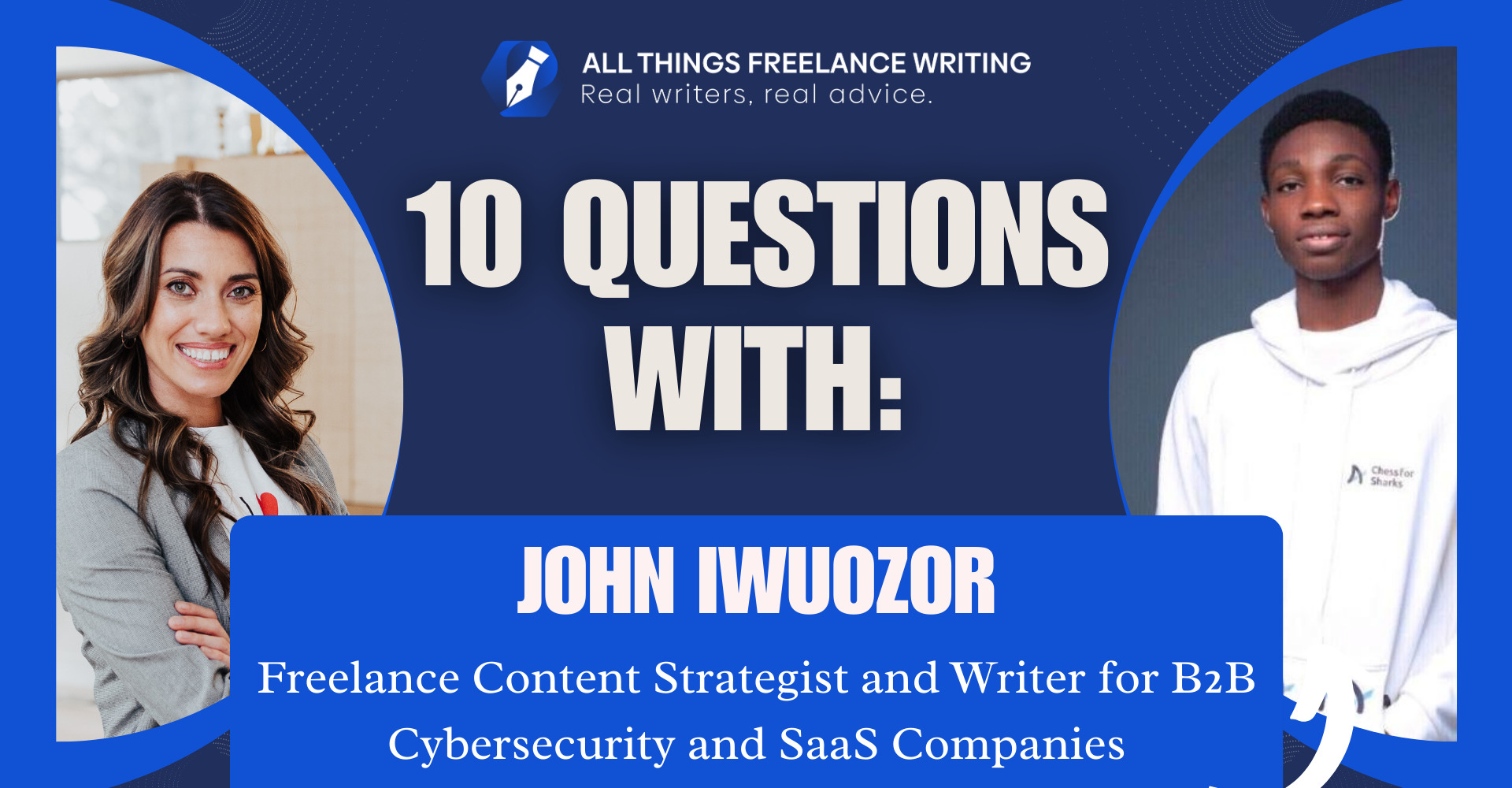John Iwuozor is a freelance content strategist and writer for B2B cybersecurity and SaaS companies. He’s also the founder of Chess for Sharks!
- From: Lagos State, Nigeria
- Began freelance writing: January 2021
- About: John writes for Forbes Advisor, Hackernoon, IT Security Guru, and more. He also launched Chess for Sharks and grew it to 27k clicks and 2.12 M impressions in its second year.
Thank you for joining us for this interview, John!
Your rapid climb to success as a freelance writer and now strategist is very inspiring. I’m excited to share your story with the All Things Freelance Writing community!
So without further adieu, here are the 10 questions we have for you…
1. Let’s go back and start at the beginning, can you share a bit about your background and how/why you entered the content writing world?
I started as a data science intern (remote) in 2020 but ended up switching to freelance writing due to my inability to land an entry-level data scientist role. After 6 long hard months of coding and studying with no job in sight, I was ready to try out other alternatives. So, I stumbled on freelance writing during that period and because I had some experience owning a free WordPress blog and writing Medium articles during my internship, it was an easy option to explore.
2. What was your first year like as a freelance writer? What struggles did you face and how did you overcome them?
I started writing in January 2021. Honestly, it wasn’t as bad as it was for other writers starting out. As a newbie, I was lucky to work with a U.S.-based agency (2nd client) that paid me $200/1000-word article (against my asking price of $35). This gave me a huge mindset boost and taught me early on to work with clients who could pay well without requiring me to work exhaustively. For the challenges, I can highlight multiple rejections (sometimes location-based), imposter syndrome, and a mindset of lack. However, being on LinkedIn, and learning from successful freelancers were instrumental in helping me get over these struggles.
3. What would you say is the best way to learn how to create quality content that performs for clients if you have zero experience?
I learned on the go. Being able to write well is not something anyone can master in a few weeks. It takes lots of practice and feedback. For anyone starting out, I’ll recommend a simple course, not something to get stuck on (to avoid overthinking). The key is getting out there to write, fail, and learn while being honest about your skills. Starting a personal blog can be a useful way to get experience and feedback before you start offering these services publicly.
4. You’ve been published by some industry leaders like Forbes Advisor. What tips would you give writers who are looking to get into similar publications?
Leverage social platforms and show your work there. I’ve never been a fan of cold pitching, instead, I got all my highest-paying clients through LinkedIn (inbound and via the search bar). I also know some writers who say Twitter worked for them. By building publicly, you get to attract big brands, develop genuine relationships, and gain referrals.
“By building publicly, you get to attract big brands, develop genuine relationships, and gain referrals.”
-John Iwuozor
5. Satisfying Google’s E-E-A-T can be tricky for a freelance writer when it comes to product reviews. As a B2B SaaS writer, how do you suggest writers review products when they can’t get first-hand experience with them?

I struggled with this at some point but came up with some healthy hacks to handle this efficiently. If you can, you should strive for a first-hand experience (free trials, demos) with the software you’re reviewing but when this is not possible, I suggest studying the features of the product on the company’s site, pulling together existing articles on SERPs and reading customer reviews on platforms like G2, Trustradius, Capterra, and SoftwareAdvice to shape your final editorial judgment. This is really helpful to avoid misinformation and inaccuracy, especially for YMYL (Your Money or Your Life) topics.
6. Next, you’ve built a solid following and presence on LinkedIn so I’m curious…How has the platform contributed to your growth and success as a writer and strategist? Do you think up-and-coming professionals in the content marketing space should be active there?
Over the past few months, LinkedIn has become my favorite platform. The reason is not far-fetched– lots of professionals to learn from, a medium to demonstrate your expertise, and a place to generate leads. I’ll readily recommend it to anyone trying to find their way in content marketing and freelance writing.
7. I’d also love to hear a bit about your transition into content strategy. When did you decide you wanted to go in that direction instead of solely writing?
Resolving to niche into content strategy was a decision I made in early 2022. Without noticing it, I was actually tired (or bored) of just receiving briefs, writing, and submitting without any insights on how well my writing was doing a.k.a its performance. I just felt like a writing machine, so when I stumbled on Chima Mmeje’s content strategy course landing page, she highlighted this exact issue which I could relate with. Seeing that, I decided to add strategy to my offerings so I could plan content from the start to the end, and of course, improve my earnings.
8. Your Chess for Sharks results are very impressive. 27k clicks and 2.12 M impressions over the last year for a new site. What do you attribute that success to?
Starting out, I made some grave mistakes – writing with no strategy in mind, poor user interface, and a weak internal linking strategy amongst others. After I got enlightened, I decided to take a topic cluster approach and rebranded with a new logo, theme, and site structure. I also prioritized internal linking by paying attention to relevance and search queries and optimized existing content by focusing on search intent, tags, and categories. When it comes to organic traffic generation, a lot of things come into play. However, with this new approach, my site traffic increased dramatically. It’s work-in-progress though.
9. Are there any common mistakes you see businesses make with content that holds back their performance in the SERPs?
I worked with some brands in my first year, and I noticed some huge mistakes. One is lack of clarity – not knowing what you’ll like to rank for, or the right keywords to employ. Funnily enough, these same brands invest money in cheap content and expect quick results. That’s not how it works. Rushing to engage in content marketing because of FOMO without knowing your “why”, “what” and “how” is synonymous with throwing money out the window.
“Rushing to engage in content marketing because of FOMO without knowing your “why”, “what” and “how” is synonymous with throwing money out the window.”
-John Iwuozor
10. What’s next for you? What do you have planned for 2023?
Well, I’ve not exactly planned out life for 2023. At the moment, I’m just working on my goal of hitting my first $100k this year. I figured that I’ll be able to do this if I gave more attention to strategy rather than just writing.
Where can our community learn more about you, see your work, and follow you?
You can reach me on LinkedIn (hyperactive there) and here’s my Twitter. To recap, I’m a content strategist and writer for B2B Cybersecurity and SaaS brands. Here’s my website and my portfolio in detail.
Thanks so much, John! Congrats on your success so far and we look forward to what’s to come for you in 2023.


